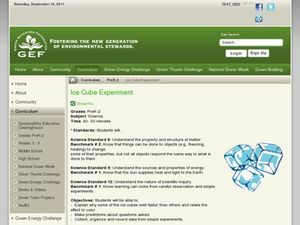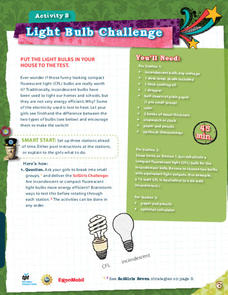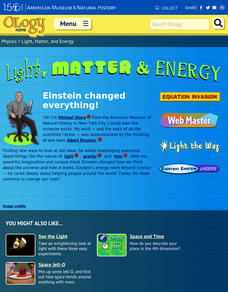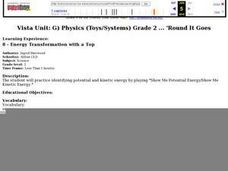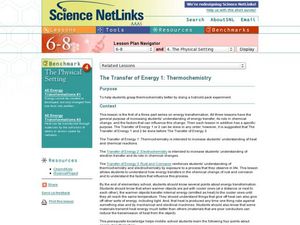American Museum of Natural History
See the Light
It's time to see the light! Scholars perform three different experiments with light to reveal properties using a great remote learning resource. The pupils see how light reflects from a surface and refracts through different materials....
Colorado State University
How Can You Demonstrate the Different Efficiencies of Different Light Bulbs?
Need a bright idea for an engaging lab? Watch your class light up as they explore the difference in efficiency between incandescent and LED bulbs! The resource makes use of simple materials and encourages learners to infer what's...
Teach Engineering
Light Intensity Lab
Let there be light. The last installment of a seven-part series has pupils conduct an experiment on light attenuation through different numbers of transparency sheets. They then relate the results back to how X-rays measure bone density.
Curated OER
Sensing Energy: Designing to Stay Cool
Young scholars examine the energy the sun produces on a daily basis. In groups, they discover the properties of visible and invisible light. They also adjust the exposure time to change the properties of various objects. To end the...
Curated OER
Energy Efficiency Ambassadors
Definitely for high schoolers, this lesson is an open-ended exploration of energy efficiency. Groups of two to three junior environmental engineers design an experiment to test for efficiency. They prepare a full lab report and...
Curated OER
Ice Cube Experiment
Students explore the rate at which ice melts. In this science lesson, students place ice cubes on colored index cards and place them in direct sunlight. Students observe which ice cubes melt fastest and slowest.
Curated OER
Energy and Change: The Five Basic Laws
Five basic law of physics and energy are listed here, with a simple explanation of what each actually means in the real world! Your young physicists will appreciate the concepts being made more relevant and the language being made more...
Carnegie Mellon University
Consumer Preferences in Lighting
What is a watt? This tongue-twisting, mind-bending question and others are answered through this lesson on the different lighting options available. With the support of a PowerPoint, teach your physical science class about units of...
Curated OER
Black and White Bottle Experiment
Students investigate solar energy and color. In this solar energy lesson, students assess the benefits of solar energy. Students discover that solar energy is attracted to darker colors and conduct an experiment using colored...
PBS
Light Bulb Challenge
Efficiency equals money where homes are concerned. A comparative lesson asks learners to measure heat output of incandescent and compact fluorescent light bulbs. They follow their investigation with calculating the cost of using the two...
Bonneville
Introduction to Energy
Transform the classroom with energy. Pupils learn about different types of energy and practice identifying the types in the first lesson of six in a solar versus wind energy unit. The class sees examples of how one type of energy can be...
Cornell University
Shedding a "Little" Light on Cancer Surgery
Many types of cancer treatments now depend on nanotechnology—a big "little" discovery. Scholars begin by removing "malignant" tissue from simulated brains, one using fluorescent markers thanks to nanotechnology and one without. This...
American Museum of Natural History
Light, Matter and Energy
Let Einstein's work shine the way. Pupils read about Einstein's iconic equation, E=mc^2, using a remote learning resource and see how ideas from other scientists such as Kepner, Curie, Galilei, and Newton led to its discovery. They...
Urbana School District
Light
You matter, unless you multiply yourself by the speed of light ... then you energy. Presentation covers the behavior of light as both a wave and a particle, light versus sound, space travel, why objects have colors, depth perception,...
Curated OER
Urban Heat Islands: An Introduction to Energy Transfer and Transformation
Elementary school physical scientists explore kinetic mechanical energy by dropping a golf ball on different surfaces. They discuss how human made materials might react to light differently from nature made materials. This lesson plan...
Curated OER
What is Energy?
Youngsters take a look at the foods they eat, and how they provide energy for them to do things. They look at how body uses the food energy to create movement. Pupils also look at toys/devices in the room that need electrical energy...
Curated OER
Energy Transformation with Balance Toys
Students explore and identify the concepts of potential and kinetic energy. They define kinetic and potential energy and discuss examples of each. Students then play a game involving balance toys, demonstrating both kinetic and potential...
Curated OER
Energy Transformation with Simple Machines
First graders identify both potential and kinetic energy in a game they play in the classroom. They listen as the teacher explains the difference between potential and kinetic energy when observing a simple machine. Using simple...
Curated OER
Energy Transformation with a Top
Second graders examine both potential and kinetic energy. After discussing the difference and examples of potential and kinetic energy, they participate in a game of "Show Me Potential Energy/Show Me Kinetic Energy" using toy tops.
Curated OER
The Transfer of Energy 1: Thermochemistry
Budding chemists achieve a basic understanding of the role of heat in chemical reactions. An online worksheet gives learners instructions and questions to answer as they investigate the Chem4Kids website and perform a hands-on lab...
Teach Engineering
Light Up Your Life
How do lighting types affect energy efficiency? Explore different types of lighting and the energy they use. Pupils learn about types of lights and calculate the energy used during a typical school year. They discover that being...
Teach Engineering
Light vs. Heat Bulbs
Careful, that light bulb is hot! Compare heat and light energy using a simple light bulb. The exercise addresses energy conservation and presents actual calculations to determine the most cost-effective light bulb.
Messenger Education
Sensing the Invisible: The Herschel Experiment
The electromagnetic spectrum includes everything from very powerful gamma rays (which are used to treat cancer) to much weaker radio waves (which include microwaves). Through a hands-on activity, scholars explore the temperature...
It's About Time
Exploring Energy Resource Concepts
Please turn off the lights to conserve energy. Or not, after all energy is always conserved. This first lesson in an eight-part series includes three parts. Part A contains one hands-on activity and two inquiry-based experiments on heat...







